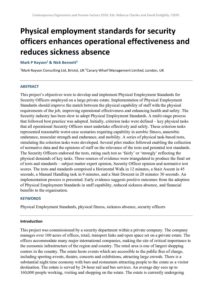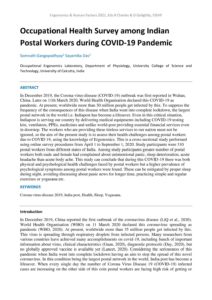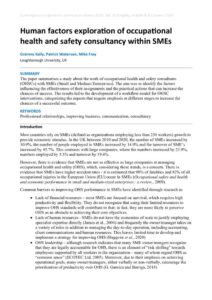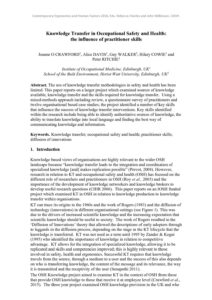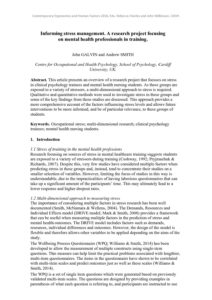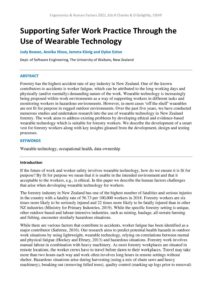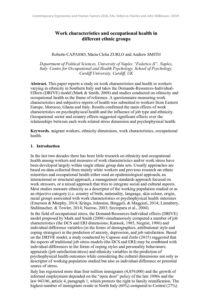Occupational health
Physical employment standards for security officers enhances operational effectiveness and reduces sickness absence
| Document | Author Mark P Rayson & Nick Bennett |
| Abstract This project’s objectives were to develop and implement Physical Employment Standards for Security Officers employed on a large private estate. Implementation of Physical Employment Standards should improve the match between the physical capability of staff with the physical requirements of the job, improving operational effectiveness and enhancing health and safety. The Security industry has been slow to adopt Physical Employment Standards. A multi-stage process that followed best practice was adopted. Initially, criterion tasks were defined – key physical tasks that all operational Security Officers must undertake effectively and safely. These criterion tasks represented reasonable worst-case scenarios requiring capability in aerobic fitness, anaerobic endurance, muscular strength and endurance, and mobility. A series of physical task-based tests, simulating the criterion tasks were developed. Several pilot studies followed enabling the collection of normative data and the opinions of staff on the relevance of the tests and potential test standards. The Security Officers endorsed the tests, rating each test as ‘fairly’ or ‘strongly’ reflecting the physical demands of key tasks. Three sources of evidence were triangulated to produce the final set of tests and standards – subject matter expert opinion, Security Officer opinion and normative test scores. The tests and standards comprised a Horizontal Walk in 12 minutes, a Stair Ascent in 45 seconds, a Manual Handling task in 9 minutes, and a Stair Descent in 20 minutes 30 seconds. An implementation process is presented. Early evidence suggests positive outcomes from the adoption of Physical Employment Standards in staff capability, reduced sickness absence, and financial benefits to the organisation. |
Occupational Health Survey among Indian Postal Workers during COVID-19 Pandemic
| Document | Author Somnath Gangopadhyay and Sayantika Das |
| Abstract In December 2019, the Corona-virus-disease (COVID-19) outbreak was first reported in Wuhan, China. Later on 11th March 2020, World Health Organisation declared this COVID-19 as pandemic. At present, worldwide more than 30 million people get infected by this. To suppress the frequency of the consequences of this disease when India went into complete lockdown, the largest postal network in the world i.e. Indiapost has become a lifesaver. Even in this critical situation, Indiapost is serving our country by delivering medical equipments including COVID-19 testing kits, ventilators, PPEs, medicines and unlike world-post providing essential financial services even in doorstep. The workers who are providing these tireless services to our nation must not be ignored, so the aim of the present study is to assess their health challenges among postal workers due to COVID 19, using the knowledge of Ergonomics. This is a cross-sectional study performed using online survey procedures from April 1 to September 1, 2020. Study participants were 310 postal workers from different states of India. Among study participants greater number of postal workers both male and female had complained about unintentional panic, sleep deterioration, acute headache than acute body ache. This study can conclude that during this COVID-19 there was both physical and psychological health challenges faced by postal workers but a higher prevalence of psychological symptoms among postal workers were found. These can be mitigated by proper sleep during night, avoiding discussing about panic news for longer time, practicing simple and regular exercises or yogasana etc. |
Human factors exploration of occupational health and safety consultancy within SMEs
| Document | Author Grainne Kelly, Patrick Waterson, Mike Fray |
| Abstract The paper summarises a study about the work of occupational health and safety consultants (OHSCs) with SMEs (Small and Medium Enterprises). The aim was to identify the factors influencing the effectiveness of their assignments and the practical actions that can increase the chances of success. The results led to the development of a workflow model for OHSC interventions, categorizing the aspects that require emphasis at different stages to increase the chances of a successful outcome. |
Knowledge Transfer in Occupational Safety and Health: the influence of practitioner skills
| Document | Author Joanne O CRAWFORD, Alice DAVIS, Guy WALKER, Hilary COWIE and Peter RITCHIE |
| Abstract The use of knowledge transfer methodologies in safety and health has been limited. This paper reports on a larger project which examined sources of knowledge available, knowledge transfer and the skills required for knowledge transfer. Using a mixed-methods approach including review, a questionnaire survey of practitioners and twelve organisational based case studies; the project identified a number of key skills that influence the success of knowledge transfer interventions. Key skills identified within the research include being able to identify authoritative sources of knowledge, the ability to translate knowledge into local language and finding the best way of communicating knowledge and information. |
Informing stress management. A research project focusing on mental health professionals in training.
| Document | Author John GALVIN and Andrew SMITH |
| Abstract This article presents an overview of a research project that focuses on stress in clinical psychology trainees and mental health nursing students. As these groups are exposed to a variety of stressors, a multi-dimensional approach to stress is required. Qualitative and quantitative methods were used to investigate stress in these groups and some of the key findings from these studies are discussed. This approach provides a more comprehensive account of the factors influencing stress levels and allows future interventions to be more informed, and be of particular relevance, to these groups of students. |
Supporting Safer Work Practice Through the Use of Wearable Technology
| Document | Author Judy Bowen, Annika Hinze, Jemma König and Dylan Exton |
| Abstract Forestry has the highest accident rate of any industry in New Zealand. One of the known contributors to accidents is worker fatigue, which can be attributed to the long working days and physically (and/or mentally) demanding nature of the work. Wearable technology is increasingly being proposed within work environments as a way of supporting workers in different tasks and monitoring workers in hazardous environments. However, in most cases ‘off the shelf’ wearables are not fit for purpose in rugged outdoor environments. Over the past five years, we have conducted numerous studies and undertaken research into the use of wearable technology in New Zealand forestry. The work aims to address existing problems by developing ethical and evidence-based wearable technology which is suitable for forestry workers. We describe the development of a smart vest for forestry workers along with key insights gleaned from the development, design and testing processes. |
Work characteristics and occupational health in different ethnic groups
| Document | Author Roberto CAPASSO, Maria Clelia ZURLO and Andrew SMITH |
| Abstract This paper reports a study on work characteristics and health in workers varying in ethnicity in Southern Italy and takes the Demands-Resources-Individual-Effects (DRIVE) model (Mark & Smith, 2008) and studies conducted on ethnicity and occupational health as the frame of reference. A questionnaire measuring work characteristics and subjective reports of health was submitted to workers from Eastern Europe, Morocco, Ghana and Italy. Results confirmed the main effects of work characteristics on psychophysical health and the influence of job type and ethnicity. Occupational sector and country effects suggested significant effects over the relationships between each work-related stress dimension and psychophysical health. |

